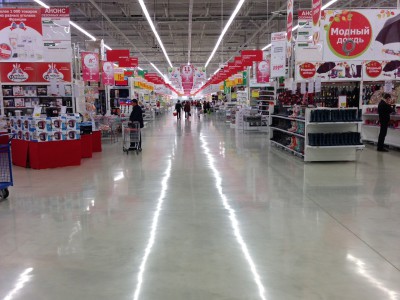Should you specify a surface hardener for concrete floors?
There are plenty of reasons to consider using a surface hardener for concrete floors. Whether the floor is being constructed for an industrial, retail or warehouse building, here are five key questions for specifiers to consider.
1) Are there steel fibres in the concrete mix?
Some floors are constructed using steel fibre reinforced concrete (SFRC). This is particularly beneficial if the floor is ‘jointless’ – ie, the floor is created by pouring large bays, which don’t have saw-cut joints in them. If SFRC is being used, then a surface hardener will help to suppress any fibres which occur near the surface, which will result in a smoother finish to the floor.
2) How much cement is in the concrete mix?
Some concrete mixes contain lower quantities of cement, and may use substitutes such as ground granulated blastfurnace slag (ggbs) and fly ash. Using less cement helps to control concrete shrinkage and is more environmentally friendly, too. However, a mix which contains cement replacements can have a lower abrasion resistance, which means the surface will damage more easily unless it is protected. Using a surface hardener on top of the fresh slab will add important abrasion resistance to the concrete floor.
3) Does this concrete floor need to be coloured?
If a floor needs to be coloured, then using a surface hardener is a cost-effective way to do it. It may be that different ‘zones’ need to be created; or that the client wants their brand colours to be used on the floor. Adding the colour at the end of the floor’s construction saves the need for using coloured concrete, or for painting the floor at a later date. We have 16 standard colours in our surface hardener range, and we can blend bespoke colours too. Even using our ‘grey’ coloured surface hardener makes a huge difference to the floor’s appearance!
4) How hard will this concrete floor have to work?
This depends on several things – what the building will be used for; whether there will be pedestrian or vehicular traffic; the type of wheels on the vehicles; whether there is a risk of impact or abrasion damage (caused by things dropping on the floor or scraping across it). This is called ‘duty’ – and choosing a surface hardener will depend on a combination of these things to determine whether the floor will experience heavy, medium or light duty. We have concrete surface hardeners for different applications and degrees of duty.
5) How long will the concrete floor need to last?
This involves balancing up-front and lifetime costs. If a client is commissioning their own building, they may want to ensure that the floor will last for many years, with minimum repairs – and they may be willing to pay more during construction to reap the rewards later. If the building is to be sold quickly, or rented, then the longevity of the floor may matter less than the initial cost (if, for example, the tenant will be responsible for the upkeep of the floor). For those who want to build to last, our range contains heavy-duty surface hardeners that can be applied as a dry-shake. For even better results, applying a surface hardener as a wet-on-wet slurry will improve the floor’s appearance and lifespan yet further.
Browse our range of surface hardeners for concrete floors now >>




